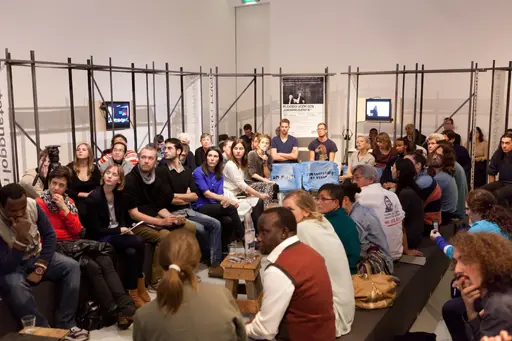
until 29 October 2019
Course: Instituting Otherwise
This course has been cancelled
Part of BAK Public Studies, the course Instituting Otherwise, which takes place at BAK, basis voor actuele kunst in Utrecht from 8–29 October 2019, focuses on the possibilities of the (art) institution within and in spite of the current political predicament.
Part of BAK Public Studies, the course Instituting Otherwise, which takes place at BAK, basis voor actuele kunst in Utrecht from 8–29 October 2019, focuses on the possibilities of the (art) institution within and in spite of the current political predicament. The course re-imagines the (art) institution through a notion of instituting that is an ongoing process of aesthetico-political practice driven by an active, reciprocal relationship with the publics. The (art) institution is envisioned as a site of interlocution between care and power that involves multi-directional learning, exchange, negotiation, and being together otherwise on the basis of shared urgencies and struggles.
Drawing from BAK’s renowned projects and publications, including Propositions for Non-Fascist Living (2017–ongoing), Former West (2008–2016), Future Vocabularies (2013–2016), Future Publics (The Rest Can and Should Be Done by the People) (2015), and Becoming Oneself (2002), the following concepts are discussed: critique-as-proposition, from institutional to infrastructural critique, instituting vs. institutionalization, care and power, “future publics,” “assemblisms,” as well as solidarity and friendship, among others. The course includes the deep reading of essential writings on this subject, as well as the analysis of works by artists, theorists, and activists such as Athena Athanasiou, Matthijs de Bruijne, Forensic Architecture, Andrea Fraser, Stefano Harney, Jeanne van Heeswijk, Aernout Mik, Andrea Phillips, Gerald Raunig, Jonas Staal, Hito Steyerl, Marina Vishmidt, and others. The course is taught by Maria Hlavajova, BAK general and artistic director.
Participation in the course is open to all concerned with the question as to what art and its institutions can do in times like ours.
Drawing from BAK’s renowned projects and publications, including Propositions for Non-Fascist Living (2017–ongoing), Former West (2008–2016), Future Vocabularies (2013–2016), Future Publics (The Rest Can and Should Be Done by the People) (2015), and Becoming Oneself (2002), the following concepts are discussed: critique-as-proposition, from institutional to infrastructural critique, instituting vs. institutionalization, care and power, “future publics,” “assemblisms,” as well as solidarity and friendship, among others. The course includes the deep reading of essential writings on this subject, as well as the analysis of works by artists, theorists, and activists such as Athena Athanasiou, Matthijs de Bruijne, Forensic Architecture, Andrea Fraser, Stefano Harney, Jeanne van Heeswijk, Aernout Mik, Andrea Phillips, Gerald Raunig, Jonas Staal, Hito Steyerl, Marina Vishmidt, and others. The course is taught by Maria Hlavajova, BAK general and artistic director.
Participation in the course is open to all concerned with the question as to what art and its institutions can do in times like ours.
BAK Public Studies
BAK Public Studies offer critical insights into theoretical foundations and concrete actualizations of art as public practice. Understanding art in relation to both theory and social action, BAK Public Studies form a space for collective thinking, imagining, and acting in parallel to BAK’s politically-driven and theoretically-informed research, discourse, exhibitions, and publications. The introductory course, Art and Politics, consists of six weekly sessions on how and where art meets the political at present. The introductory course takes a broad view on artistic production, institutions, and publics and attempts to build a critical vocabulary through which to reshape understanding and practice of art in the face of present global challenges. The subject-specific courses offer more concentrated learning trajectories so as to allow for an in-depth study of concrete problematics.